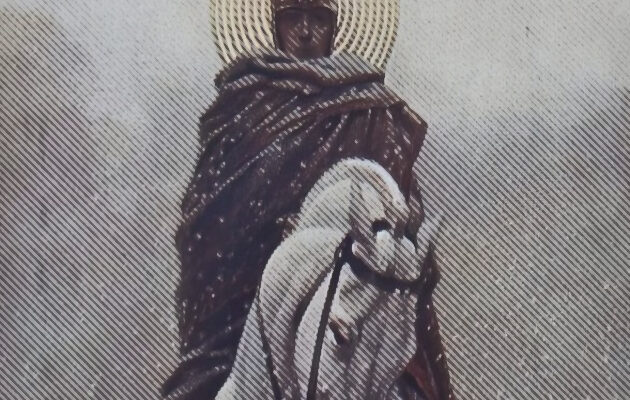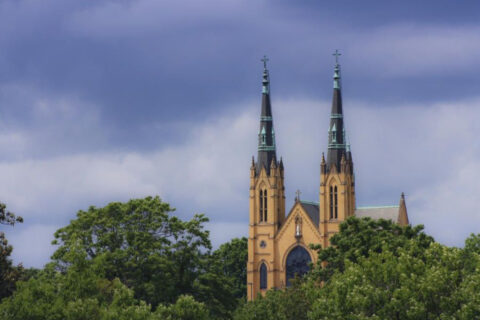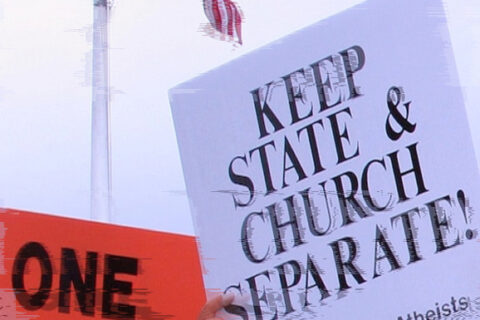Patron saints are not very popular in the West today. An athlete, a powerful, charismatic politician, a social media influencer – those are the kinds of people likely to get the attention of the average Westerner.
It is not like that everywhere in Christendom, however. Some countries have escaped the heavier ravages of secularism. Romania, in eastern Europe, is one of them, and therefore retains a vibrant love for their various patron saints. The feast day of St. Demetrius the New, the Patron Saint of Bucharest, drew tens of thousands this year:
More than 40 Romanian hierarchs from throughout the country and the Romanian Church’s diaspora dioceses came together to celebrate Bucharest’s patron saint last week.
They were joined by Metropolitan Panteleimon of Veria of the Greek Orthodox Church and Metropolitan Naum of Ruse of the Bulgarian Orthodox Church for the feast of St. Demetrius the New on October 26-27.
Every year, a week-long pilgrimage is held in honor of the saint, with processions and festive hierarchical celebrations. Met. Panteleimon brought relics of St. Demetrios the Myrrh-Gusher and the Panagia Sumela Icon from Greece for the pilgrimage this year.
More than 60,000 people had come to venerate the relics of St. Demetrius as of his feast day on Friday, though more came to venerate by the time the pilgrimage ended on Sunday.
The Western countries miss out on a lot by rejecting patron saints. One thing may be seen quite readily in the report from Bucharest: unity. Sixty thousand people gathered together into one place to honor this holy man. Is it likely that they agree on everything under the sun? Not at all. And yet through their desire to honor this saint, this friend of God, they are able to transcend their differences and assemble peaceably as friends.
Second, Western peoples are unable to receive the comfort and healing that patron saints give to their cities and countries. St. Paraskeva of Iasi, Romania, is a wonderful example in this regard. Her feast day gathers even more pilgrims than St. Demetrius, running into the hundreds of thousands. And it is because she is so compassionate towards those who seek her help (as are all saints) that they resort to her in such large numbers:
Following the Gospel, a message from His Beatitude Patriarch Daniel of Romania was read, in which he explained why the people love St. Paraskeva:
‘The great piety of the righteous people towards Venerable Paraskeva is explained by the conviction and finding that she is “very useful,” as she is called in her Akathist. St. Paraskeva offers help through her prayers, to young and old, to virgins and mothers, to monasteries and families, to the sick and to the poor, gathering the clergy and the people in prayer and common confession, from Romania and other countries. Her power comes from her holiness and goodness, that is, from her love for God and for men.’
And Met. Andreas from Crete emphasized that:
‘St. Andrew of Crete and St. Paraskeva of Epivat received the grace of the Holy Spirit because they spent their lives in prayer and became bearers of incessant prayer. Pure and unceasing prayer made them partakers of the Holy Mysteries of the glory of God. They became our saints, witnesses of the mysteries of the Orthodox Church and culture.
‘With enlightened minds and heart purified by passions, today, in Iași, Sts. Paraskeva and Andrew have become and remain recipients and transmitters of the mystery of the grace of the Holy Spirit, bearers of God and bearers of Christ…’
A miracle from this year’s gathering in Iasi has already been revealed:
This year, a mother in Constanța was among the pilgrims who traveled hundreds of miles hoping for the intercession of St. Parascheva. She had recently happened upon the many miraculous accounts shared by Fr. Alexandru on his social media, and despite infrequently attending the Divine Liturgy and never before making such a pilgrimage, she packed her things and prepared to attend the Feast.
Her hope was in the healing of her son. He was seven years old and unable to speak, had frequent seizures and severe bouts of night terrors and agitation. A multitude of specialists were unable to treat the condition, leading her to finally seek consolation at the relics of the saint. She described waiting amongst the throngs of pilgrims for four hours with her child in her arms, who upon arriving to the Cathedral was still and calm for the first time, as if sedated. As they waited in the cold, she prayed: “God, if you love this child and can give me a chance, help me!” She approached the holy relics for veneration, touched her palm to the saint’s garments and rested her head upon her son. The mother related to Fr. Alexandru that they then quickly set out to return to Constanța for the long journey home and the boy fell asleep. But after some time had passed, and before they arrived, her son awoke and spoke for the first time the words “Saint Parascheva, thank you!” His first words were not “mama” or “papa”, but this full sentence expressing gratitude toward the saint. The following day, the boy continued to say “Saint Parascheva, thank you!” and also “I love you, mother!”, speaking more words in 24 hours than he had in the entirety of his life.
In her message, the grateful mother concluded: “I testify that my life changed in a second. I have not been a Believer, a faithful servant of God, but I know that God loves us so much that He is patient and works in a way that nothing is impossible with Him.”
Third, the saints protect us against evil powers. Westerners have grown very skeptical and relaxed about the existence of the devil and the other fallen angels (his demons), but despite that, they are still very real, and their existence is being acknowledged anew by some unexpected people. Rod Dreher writes,
In one of the book’s [i.e., Encounters—W.G.] later chapters, Pasulka profiles a woman she calls “Simone,” a top investor in Artificial Intelligence and other tech fields. One thing that might startle you (it did me) in coming to the UFO and related fields is that most of those involved in it at a high level do not believe these are beings from other planets. Rather, they believe that these are some kind of discarnate superior intelligences from another dimension. I mentioned this in London this week to an investor from California, who said yes, everybody he knows in Silicon Valley thinks that, and some even hold rituals to summon these intelligences.
Simone believes that AI is one way that these entities are opening up to communicate with us — and she’s excited about it…
I should say that Pasulka, who is Catholic, does not necessarily endorse any of this. She’s just reporting what she’s found in her research. What struck me about all this is an interview I did last year with a former occultist who claimed that these higher entities — to him, demons, which he worshiped for years — disclosed that they intend to merge humanity with machines as a precursor to humanity’s destruction. I did not know what he could be talking about. Now I do. He’s talking about a kind of spirit possession achieved through AI.
Last week, I sent Dr. Pasulka some interview questions about Encounters. In them, I posed a query about Simone’s view, and described AI as a “high-tech Ouija board.” Dr. Pasulka said she hadn’t thought about it that way, but yes, that’s pretty much what Simone (and many others in that field) are talking about: that AI is a vector that allows for the exchange of information with discarnate higher beings.
Watching Peter, Ray, and Egon blow up the Stay Puft Marshmallow Man in Ghostbusters with the energy streams from their proton packs might make for entertaining cinema, but it is ridiculous to believe that secular scientists in the real world, who are actively seeking contact with demons through their tech inventions, are going to rescue any of us from the evil spirits they are attempting to put us into contact with. This is where the saints come to our aid. The following is from the life of St. Martin of Tours,
At the same time the servant of one Tetradius, a man of proconsular rank, having been laid hold of by a demon, was tormented with the most miserable results. Martin, therefore, having been asked to lay his hands on him, ordered the servant to be brought to him; but the evil spirit could, in no way, be brought forth from the cell in which he was: he showed himself so fearful, with ferocious teeth, to those who attempted to draw near. Then Tetradius throws himself at the feet of the saintly man, imploring that he himself would go down to the house in which the possessed of the devil was kept. But Martin then declared that he could not visit the house of an unconverted heathen. For Tetradius, at that time, was still involved in the errors of heathenism. He, therefore, pledges his word that if the demon were driven out of the boy, he would become a Christian. Martin, then, laying his hand upon the boy, cast the evil spirit out of him. On seeing this, Tetradius believed in the Lord Jesus, and immediately became a catechumen, while, not long after, he was baptized; and he always regarded Martin with extraordinary affection, as having been the author of his salvation.
About the same time, having entered the dwelling of a certain householder in the same town, he stopped short at the very threshold, and said, that he perceived a horrible demon in the courtyard of the house. When Martin ordered it to depart, it laid hold of a certain member of the family, who was staying in the inner part of the house; and the poor wretch began at once to rage with his teeth, and to lacerate whomsoever he met. The house was thrown into disorder; the family was in confusion; and the people present took to flight. Martin threw himself in the way of the frenzied creature, and first of all commanded him to stand still. But when he continued to gnash with his teeth, and, with gaping mouth, was threatening to bite, Martin inserted his fingers into his mouth, and said, “If you possess any power, devour these.” But then, as if redhot iron had entered his jaws, drawing his teeth far away he took care not to touch the fingers of the saintly man;… he had no power of escaping by the mouth, he was cast out by means of a defluxion of the belly, leaving disgusting traces behind him.
St. Martin, as we have pointed out in another place, is very important for Louisiana. He is a Patron for us, just as he is for our kinsmen in France, just as St. Alfred the Great is for the South as a whole. Louisiana, like most of the West, has walked a great distance away from traditional Christianity, including its veneration of patron saints. The results are unfortunate but not unexpected – disunity, despair, and the notable increase in demonic influence upon society (brutal murders, gender confusion, interest in the occult, etc.).
Whatever path the rest of the West may choose to take, let us in Louisiana, at least, come to our senses and begin making a return to the Church. A great treasure, a bone relic of St. Martin of Tours, rests in St. Martin de Tours Church in St. Martinville in St. Martin Parish. This should be the epicenter of our Christian piety here in Louisiana. All of our State leaders (religious, political, etc.) should lead us there at least once a year, on St. Martin’s main feast day (11 Nov.), to worship God, honor His highly exalted friend, and make our prayers and supplications to St. Martin for the well-being of la Louisiane. A secondary feast falls conveniently enough on July 4th, which was the day of the dedication of a cathedral in St. Martin’s honor many centuries ago in Tours and the translation of his relics into it.
We need fathers in our physical, earthly families, and we need them in our spiritual life as well. Their absence in either one leads to dysfunction (which we have a lot of here in Louisiana). St. Martin is waiting for us in St. Martinville, waiting for us to welcome him back into the life of our State as her patron and father, eager to bestow upon us the unity, healing, and protection that he, being full of the Grace of God, is able to give. We shouldn’t keep him waiting any longer.
-By Walt Garlington

O I’m a good old rebel, now that’s just what I am. For this “fair land of freedom” I do not care at all. I’m glad I fit against it, I only wish we’d won, And I don’t want no pardon for anything I done.






Western countries couldn’t have patron saints even if we wanted to. The Jews will sue any city or town that tries to do that; smh, can’t even have a Christmas tree in public places without them ruining things.
Americans have no need for saints, because they venerate themse!ves.
Do you think patron saints should also be promoted in Protestant countries? Obviously, most Protestants believe in the sainthood of all believers, so I think that would come into conflict with the ideas described in this article.